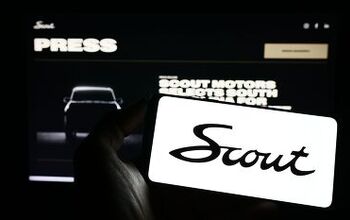U.S. Treasury Bows to Industry Pressure On EV Tax Credit Scheme

The United States Department of the Treasury appears to have caved after receiving sustained pressure from the auto lobby, modifying how vehicles are classified in the updated EV tax credit scheme in a manner designed to make more vehicles eligible. Rather than leaning on Corporate Average Fuel Economy (CAFE) standards, the Treasury has said it will instead use the Environmental Protection Agency’s (EPA) Fuel Economy Labeling standard to determine when a vehicle is an SUV, pickup, sedan, or van.
"This change will allow crossover vehicles that share similar features to be treated consistently," the department explained on Friday. "It will also align vehicle classifications under the clean vehicle credit with the classification displayed on the vehicle label and on the consumer-facing website FuelEconomy.gov."
While the Biden administration managed to pass the relevant legislation in August, amendments designed to restrict the automotive sector from indefinitely benefiting from the credit scheme have become a sore spot for automakers. Despite the original EV tax credits allegedly existing just to get the ball rolling on battery electric vehicles way back in 2005, the industry has grown accustomed to green-washing itself in exchange for government subsidies. In fact, the Alliance for Automotive Innovation (the world’s largest automotive lobbying group) immediately issued a warning that the number of vehicles qualifying under the updated plan would be few in number when the climate bill was approved.
The biggest problem was that almost no EVs sold in the United States were capable of meeting the domestic content requirements designed to move the country away from being wholly reliant on Chinese-made batteries. But there were also provisions made to cap eligibility of the $7,500 tax credit based on income and MSRP. While SUVs, pickups, and vans can be priced up to $80,000 and still qualify, vehicles categorized as sedans, coupes, and station wagons were capped at $55,000.
Since crossovers typically have more in common with unibody passenger cars than they do pickups and SUVs they’re typically regulated as the former – including under federal CAFE standards. This meant a lot of all-electric crossovers would be categorized accordingly and capped at $55,000 for any tax credit eligibility.
By December, the Treasury said it was going to need more time to offer its own guidance on the rules and appears to have found a loophole in the successive weeks. By stating that it will no longer use CAFE to classify vehicles, the department has effectively opened up the door for a handful of EVs that would have previously been too expensive to be subsidized by tax dollars.
Examples include most versions of the Cadillac Lyriq, Ford “Mustang” Mach-E, Ford Escape PHEV, Tesla Model Y, and Volkswagen ID.4.
This comes after automotive executives held numerous meetings with White House officials that reportedly included Elon Musk. While Tesla originally opposed any continuation of the EV tax credit system – with the CEO saying battery-powered vehicles had already gotten enough help – the automaker now seems to be playing the game like every other manufacturer hoping to get a piece of government cheese. This also might explain why select Tesla models recently saw dramatic price changes in anticipation of the new rules. Legacy manufacturers have likewise tweaked pricing on their EVs of late, making them about as expensive as they could be while still qualifying for tax credits.
The Alliance for Automotive Innovation has already told companies to self-certify to the Treasury Department, effectively giving them the ability to decide how vehicles should be classified under the EV tax credit scheme. While a major win for the industry, we’re already seeing how it has managed to game the system and capture regulatory bodies. Though that’s nothing new. There are countless studies showing that legislators and government agencies are far more likely to pass laws or favor regulations supported by corporate entities than those backed by average citizens.
While the Treasury has yet to issue the proposed guidance on the consumer tax credit's critical mineral and battery component requirements – indefinitely maintaining eligibility for loads of vehicles that otherwise would not qualify – it still plans on having something by the end of March. However, the formal deadline came and went in December of 2022, with swirling accusations that the department was going out of its way to ensure automakers got what they wanted.
U.S. Senator Joe Manchin (D-WV) has said everything the Treasury is doing goes against the congressional intent of the so-called Inflation Reduction Act – especially the provisions designed to ensure material sourcing was moving back toward North America and away from China.
[Image: ZikG/Shutterstock]
Become a TTAC insider. Get the latest news, features, TTAC takes, and everything else that gets to the truth about cars first by subscribing to our newsletter.

A staunch consumer advocate tracking industry trends and regulation. Before joining TTAC, Matt spent a decade working for marketing and research firms based in NYC. Clients included several of the world’s largest automakers, global tire brands, and aftermarket part suppliers. Dissatisfied with the corporate world and resentful of having to wear suits everyday, he pivoted to writing about cars. Since then, that man has become an ardent supporter of the right-to-repair movement, been interviewed on the auto industry by national radio broadcasts, driven more rental cars than anyone ever should, participated in amateur rallying events, and received the requisite minimum training as sanctioned by the SCCA. Handy with a wrench, Matt grew up surrounded by Detroit auto workers and managed to get a pizza delivery job before he was legally eligible. He later found himself driving box trucks through Manhattan, guaranteeing future sympathy for actual truckers. He continues to conduct research pertaining to the automotive sector as an independent contractor and has since moved back to his native Michigan, closer to where the cars are born. A contrarian, Matt claims to prefer understeer — stating that front and all-wheel drive vehicles cater best to his driving style.
More by Matt Posky
Latest Car Reviews
Read moreLatest Product Reviews
Read moreRecent Comments
- 2ACL I have a soft spot for high-performance, shark-nosed Lancers (I considered the less-potent Ralliart during the period in which I eventually selected my first TL SH-AWD), but it's can be challenging to find a specimen that doesn't exhibit signs of abuse, and while most of the components are sufficiently universal in their function to service without manufacturer support, the SST isn't one of them. The shops that specialize in it are familiar with the failure as described by the seller and thus might be able to fix this one at a substantial savings to replacement. There's only a handful of them in the nation, however. A salvaged unit is another option, but the usual risks are magnified by similar logistical challenges to trying to save the original.I hope this is a case of the seller overvaluing the Evo market rather than still owing or having put the mods on credit. Because the best offer won't be anywhere near the current listing.
- Peter Buying an EV from Toyota is like buying a Bible from Donald Trump. Don’t be surprised if some very important parts are left out.
- Sheila I have a 2016 Kia Sorento that just threw a rod out of the engine case. Filed a claim for new engine and was denied…..due to a loop hole that was included in the Class Action Engine Settlement so Hyundai and Kia would be able to deny a large percentage of cars with prematurely failed engines. It’s called the KSDS Improvement Campaign. Ever hear of such a thing? It’s not even a Recall, although they know these engines are very dangerous. As unknowing consumers load themselves and kids in them everyday. Are their any new Class Action Lawsuits that anyone knows of?
- Alan Well, it will take 30 years to fix Nissan up after the Renault Alliance reduced Nissan to a paltry mess.I think Nissan will eventually improve.
- Alan This will be overpriced for what it offers.I think the "Western" auto manufacturers rip off the consumer with the Thai and Chinese made vehicles.A Chinese made Model 3 in Australia is over $70k AUD(for 1995 $45k USD) which is far more expensive than a similar Chinesium EV of equal or better quality and loaded with goodies.Chinese pickups are $20k to $30k cheaper than Thai built pickups from Ford and the Japanese brands. Who's ripping who off?


































Comments
Join the conversation
@ Matt Posky. I know you are are going to parse and nitpick. Get past. the name. Inflation was an inevitability after the COVID tragedy, and also subsequent corporate gouging. While the fed uses traditional methods of trying to create unemployment to lower wages - you really want to curb inflation further: call exxon and say: If you continue to fleece the US driver - we will put a few of you in jail. Done and dusted - never going to happen.
But lets look at what this Bill is accomplishing: There are billions in new investment in manufacturing in the US. Factories are being built or repurposed. This will create thousands of jobs, increases in the tax base, and more money in the treasury. This what some people call "an investment". Maybe you'd prefer "priming the pump".
What else will it accomplish: It will incentivize the creation of new supply chains, supply chains which are almost monopolized by China. For all the huff and puff about the CCP - this is an actual national security issue. It is a real thing and it is being addressed.
What did the right do during trump? It ceded the world to China by pulling out of the TPP and weakening our alliances around the world. It raised US prices via tariffs, and created a permanent subsidy of around $100,000,000/year for lost farm contracts (Soybeans and pork). It isolated America on the world stage, and that is fine with the China - and they didn't have to lift a finger.
So new domestic supply chains, massive capital investment, new manufacturing jobs, new tax base, remaining competitive in a huge energy and transportation transition... So -besides not liking the name - what's the beef?
I started driving in the late 70's. The cars high school kids could afford and wanted were very very worn out muscle cars. Oh Lordy those V-8's bring back some happy memories. Oh there some outliers in my crowd, a VW Bug and a Dodge Scamp with slant six; neither car would die. In 10 years their will be young people wanting very used Teslas or Dodge's with hemis. B&B, I say that if someone is excited about their EV, Hybrid, or Hemi welcome them to the club of people who like cars.